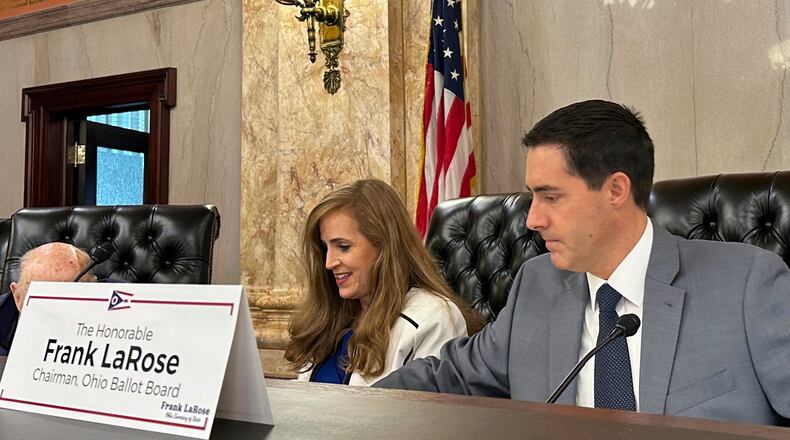In a Tuesday news release, LaRose said criminal charges were filed against 12 of 633 individuals he previously alleged had voted multiple times in the same state or two different states, committed election fraud involving deceased individuals, or were noncitizens who registered and/or voted.
Tuesday’s news release did not indicate if any of the 12 resulted in convictions.
Experts, including the liberal-leaning Brennan Center for Justice and the libertarian-leaning CATO Institute, say voter fraud, including by noncitizens, is exceedingly rare. Ohio has about 8 million registered voters.
It is illegal in the U.S. for noncitizens to vote in federal elections and the Ohio Constitution prohibits noncitizens from voting in any elections.
“The secretary of state said he found some people registered to vote that are noncitizens. It’s a very, very small percentage of voters,” said Catherine Turcer, executive director of Common Cause Ohio, in an interview earlier this month. “And one of the things we discovered when he first made announcements about this is that some of the folks that were being accused of being noncitizens were newly naturalized. So they are new citizens.”
She said there also can be mistakes in the documentation at government offices, including the Ohio Bureau of Motor Vehicles, where people can register to vote, or misunderstandings when people are asked if they want to register to vote either at the BMV or when approached in public by people registering voters.
“It could easily be that somebody got confused, especially somebody who doesn’t speak English,” Turcer said.
Butler County Prosecutor Michael T. Gmoser said he’s had no voter fraud cases involving noncitizens and a minimal number of other cases alleging voter fraud. He recalled a single conviction, several years ago, of a retiree who moved out-of-state and then voted on a Middletown issue.
Credit: Nick Graham
Credit: Nick Graham
“We have had a number of referrals and we have tracked them down and we found they were justified circumstances that didn’t warrant prosecution,” Gmoser said in an interview last week.
More than half of LaRose’s referrals announced since 2019 were in August when he alleged 597 noncitizens were registered to vote in Ohio, including 138 who he said may have cast a ballot in an Ohio election. LaRose said his office identified the alleged violations by using records provided by the Ohio BMV, the Department of Homeland Security’s federal Systematic Alien Verification for Entitlements database, the Social Security Administration, federal jury pool data, and other resources.
LaRose sent the referrals to Yost, whose spokesman Steve Irwin said earlier this month that the newest referrals are under investigation and previous ones would’ve been investigated by Yost’s office and forwarded to county prosecutors.
“Unfortunately, many of these referrals have not been pursued by law enforcement, sometimes by choice and other times due to limited prosecutorial capacity,” LaRose said in the news release. “State law gives the attorney general the authority to take up these referrals if the prosecuting attorney doesn’t prosecute the violations within a reasonable time.”
A letter from LaRose’s office to Yost said he should use his authority under Ohio Revised Code to review and possibly prosecute the cases.
“We respect prosecutorial discretion, and we don’t necessarily expect all 633 referrals to lead to criminal charges, but only 12 out of 633 shows a second set of eyes might be needed here to determine whether prosecution of these crimes is justified,” wrote Hun Yi, director of investigations for the public integrity division in LaRose’s office. “Accordingly, county prosecutors have had more than ‘a reasonable time’ to prosecute the violations and apparently have chosen not to do so. We hereby respectfully request that you use your authority under Ohio Revised Code Section 109.95 to review these cases, utilizing your own discretion, and prosecute the violations as you see appropriate.”
Irwin said Yost’s office has “received the most recent referrals and are reviewing to determine next steps.”
Follow @LynnHulseyDDN on Facebook, Instagram, TikTok and X.
About the Author



